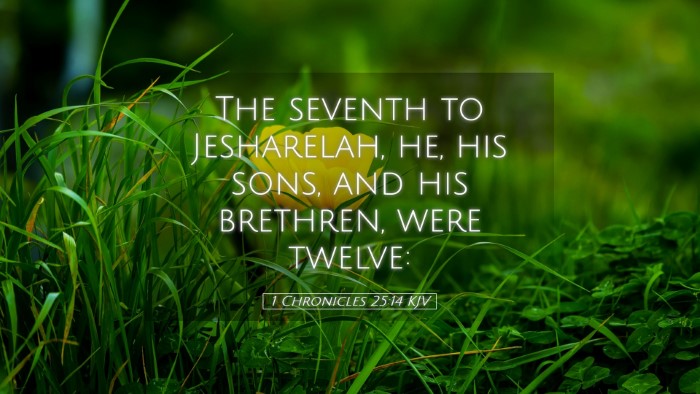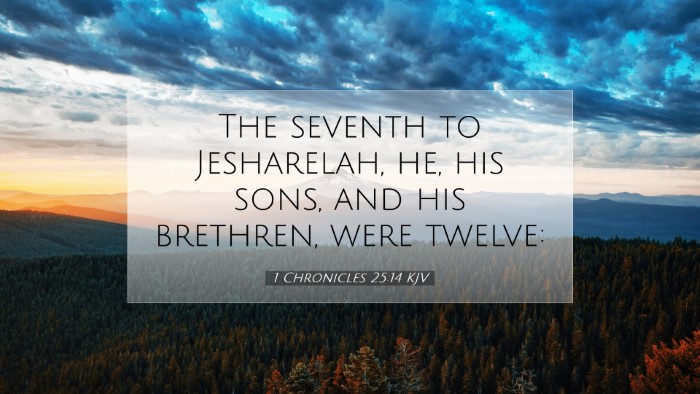Commentary on 1 Chronicles 25:14
Verse Reference: 1 Chronicles 25:14 (KJV): "The thirteenth to Shubael, he, his sons, and his brethren, were twelve."
Introduction
The book of 1 Chronicles serves as an important historical and theological document, providing insights into the worship practices and organization of the Israelites, particularly during the reign of David. In 25:14, we encounter a specific mention of the musicians who served in the temple, emphasizing the significance of music in worship. This commentary synthesizes insights from Matthew Henry, Albert Barnes, and Adam Clarke to elucidate the richness of this verse.
Theological Significance of Music in Worship
Matthew Henry notes that the organization of musicians for service in the temple illustrates the communal aspect of worship. Music is not simply an art form but a means of expressing devotion to God. It underscores the importance of preparation and order in worship as seen in the chosen leaders and their families.
Albert Barnes expands on the role of the Levites, particularly the musicians, in the temple service. In this verse, Shubael's mention signifies that music was not merely an auxiliary part of worship; rather, it was integral to the Israelites' spiritual life and community identity. The mention of the “twelve” indicates both a numerical significance and completeness, mirroring the twelve tribes of Israel.
Understanding Shubael and His Role
The name Shubael is significant in the context of the Levitical order. Adam Clarke points out that Shubael is one of the sons of the Korahites. This lineage underscores the legacy of worship associated with the Korahite family, known for their musical contributions. Clarke indicates that Shubael, along with his sons and brethren, had a vital role in facilitating worship through music, representing a restoration of true worship after periods of deviation.
The organizational structure as detailed in this verse reflects the seriousness with which David approached worship, emphasizing that God's work is performed with excellence and unity. Clarke also remarks on the responsibilities assigned, illustrating that each musician had a specific role, which highlights God's order in how worship should be conducted.
The Importance of Order and Organization
The organizational aspect is central to understanding this passage. Matthew Henry emphasizes that God values order and dedication in worship. The meticulous nature of assigning roles to the musicians indicates that every aspect, including music, was essential in glorifying God.
Albert Barnes reinforces this idea by stressing the importance of proper administration in worship practices. The fact that Shubael and his colleagues had been designated for this purpose hints at the larger theological principle: worship should be conducted with intentionality and discernment. This organizational structure invites reflection on how modern churches approach corporate worship and the necessity of structuring services to honor God.
Application for Contemporary Worship
The implications of this verse are profound for contemporary worship settings. As pastors and leaders reflect on 1 Chronicles 25:14, there is an invitation to assess the importance of music and its role within the congregation.
-
Focus on Unity: Just as the musicians of Shubael were united in purpose, modern worship teams should work collaboratively to create an atmosphere that glorifies God.
-
Valuing Every Role: Every musician, vocalist, and technical individual plays a crucial role, just as each Levite had specified responsibilities. Foster an environment that respects and appreciates every contribution.
-
Preparation and Excellence: Emulate the preparation that went into worship during the time of David, ensuring that worship is approached with a spirit of excellence and reverence.
-
Engaging the Community: Like the musicians serving the Israelites, contemporary worship must consider the communal aspect of worship, inviting participation and fostering a sense of belonging within the church family.
Concluding Thoughts
As we conclude our examination of 1 Chronicles 25:14, it is clear that this verse, while seemingly straightforward, contains layers of meaning that inform our understanding of worship. By combining insights from Matthew Henry, Albert Barnes, and Adam Clarke, we gain a holistic view of the importance of honoring God through music and worship organization. Pastors, students, and theologians alike can find valuable lessons on structure, community, and the priority of worship in the life of the church.


